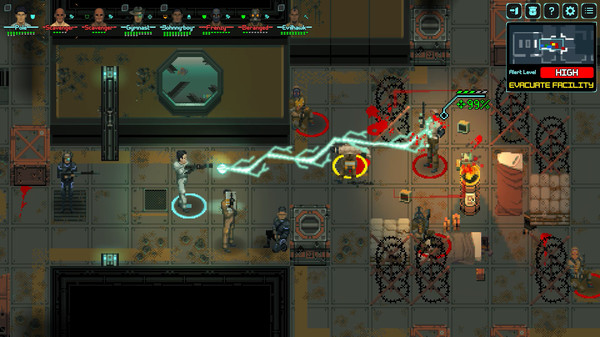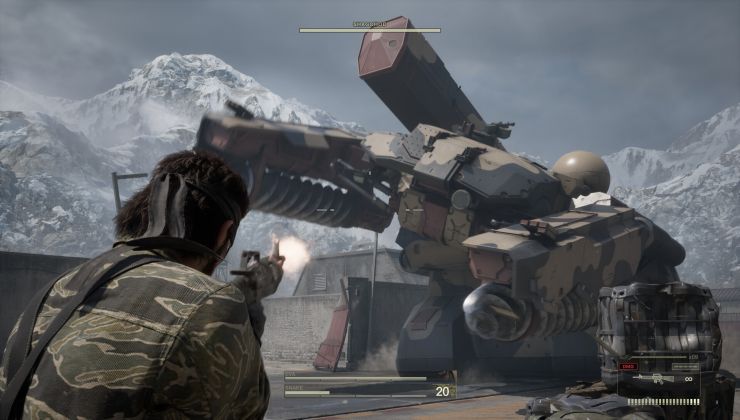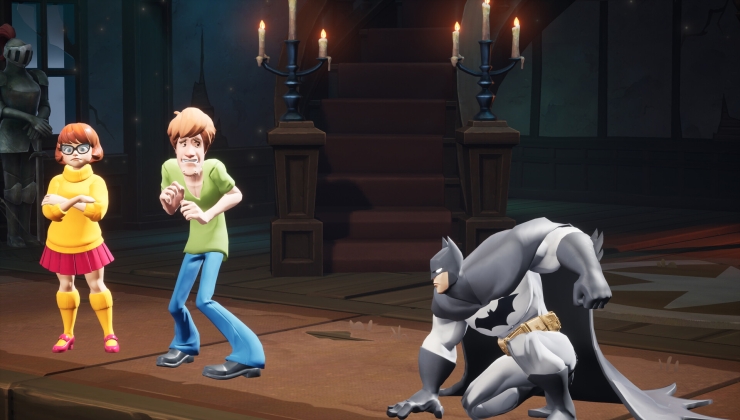Here's a case of how to definitely not deal with getting negative feedback. A developer of Depth of Extinction revoked a user's key after a negative review. Update: A statement from the developer.

Depth of Extinction is a game that went through itch's "First Access" program where they sold limited amounts of keys across various rounds. Like a lot of games that start off on itch.io, the developer promised a Steam key when the game makes into onto Valve's store. So to make matters worse, this was a user who helped fund them a little before the wider release.
You can see the Steam forum post here where the user talks about it, which is now locked by the developer which was made after they put up this user review on Steam. Looking at the short review, they're not even saying all that much and it sounds like a pretty honest post as well as remaining quite polite with their negative thoughts about it.
The reply the developer sent to the user, is a great example of how to not respond to players of your game who dislike certain aspects of it:
Sorry about that, but I thought I you weren't interested in playing the game. I would have loved to get your feedback during the First Access but I didn't see anything from you until the Steam review, which was a little confusing. I really don't see how you saw enough of the current version of the game to make the judgement call you did there since we made massive changes in the last few months that were all just on Steam.
I can get you another key if you are interested in playing more and perhaps providing some feedback on how we can improve the game.
As polite as the developer reply may seem, how could they have thought this would be a good idea? They did also apologise in a later post after. Since I actually quite like the game, it also stings a bit to see a developer I also supported do something like this. Thankfully, the situation is now resolved and the user does have access to it on Steam once again. Honestly though, I'm a little in shock that doing something like this would ever cross someone's mind.
I've given plenty of negative reviews in my time here and on Steam itself, I've later changed my mind on it especially in times when there's been a patch to improve things and this user could have done the same but that's not the point. This feels like an attempt to silence negative feedback to me, it doesn't sit right at all.
It does also bring up some interesting questions about how easy it is for developers to remove peoples access to their games. While it's a system that can help developers in certain situations, it's also a system that is quite obviously open to a bit of abuse. I do have to wonder what Valve think about this as well, so I've reached out to them for a comment and I will update this if they reply.
This does make another interesting case for DRM free games outside of Steam, since a developer can't just take away your ability to play it. While a DRM free store could remove the game from you, you're still able to fully back it up yourself.
Hat tip to madpinger for the info.
What property is and what taking another person's property is are things that are defined in law. And once an item passes its first-sale (don't know if that applies in this situation or not) then the seller no longer holds any authority over that item. Software licenses are also a property, and a seller or former possessor of a software license has no legal right to do anything to another person's software license once they have given it to someone else.Question: How are then OpenSource licenses supposed to work, e.g. GPLv3?:
You may not propagate or modify a covered work except as expressly provided under this License. Any attempt otherwise to propagate or modify it is void, and will automatically terminate your rights under this License (including any patent licenses granted under the third paragraph of section 11).
I'm not denying that this is unacceptable, both behavior and actions. I simply point to the fact that Steam can do nothing to prevent this in future. Some people here suggest to disable this revocation function for the developers but it won't solve the issue and would possibly create even more problems. On the bright side, I hope Steam will add some rules against such actions and punish the developers doing such tricks in future. Everyone would benefit from that.I participated in a closed beta test of one game, the dev sent the keys to activate the game on Steam. After the test and before the actual release they were revoked. I see this as a completely legit practice, they gave it for free and took it away later. There's no way for Steam to know if the key was paid for or just given away, maybe for a limited time so I don't see why this should be explicitly disabled for all developers. Of course, if it was a paid key that's been revoked just like this it's unacceptable but it's the first such case and it must be settled with Steam support and legal means. After all, that's not the only way the dev could scam the customers, they can ban them in-game using Steam IDs or remove the game for everybody (push empty depots or such). It's not possible to prevent this reliably.No problem with free beta keys being revoked, happens all the time, especially to me when testing Linux builds for developers.
In the case of getting a key for supporting a developer early with your money, it's absolutely mad to take it away with reasons like this.
The bit I can't get over is this:
Sorry about that, but I thought I you weren't interested in playing the game.That's a real face-palm.
edit: To address this point:That's good, I didn't know that! Thanks.
There's no way for Steam to know if the key was paid for or just given away
Yes there is. The key can be marked as beta/preview/testing etc, or retail.
Even Gabe Newell knows that DRM is a bad thing, it doesn't add anything positive. Hope one day steam makes the move of being DRM free. But let's face it DRM is still there because devs and specially companies are control freak outs, publishers and devs won't be happy if steam removes DRM. This whole thing is a ethical problem and the same happens with linux distribution, between ethical and being able to play a mp3, I choose the second. Same happens with games, lots of games wouldn't exist if DRM was banned, but still I would be demanding for devs to remove DRM when possible.
And if someone removed a game from my library I would download the torrent, that's not stealing that's someone else stealing u.
Yeah, but now the MP3 format is open! ^_^
If the person paid for the key and maybe even if they didn't, then that's called theft on the part of the game developer, and is no different than if somebody walks into your house and takes a physical possession that you have.
What property is and what taking another person's property is are things that are defined in law. And once an item passes its first-sale (don't know if that applies in this situation or not) then the seller no longer holds any authority over that item. Software licenses are also a property, and a seller or former possessor of a software license has no legal right to do anything to another person's software license once they have given it to someone else.
More information on that is in this post:
https://linustechtips.com/main/topic/953835-truth-you-own-the-software-that-you-purchase-and-any-claims-otherwise-are-urban-myth-or-corporate-propaganda/
are you sure of that?? I thought that modifying a binary was illegal.
that linustechtips topic is surely an interesting read!
A person is entitled to modify their property as they see fit, including digital products like software and movies. What they can't do is make duplicates of their single instance of a digital product and distribute it.
What property is and what taking another person's property is are things that are defined in law. And once an item passes its first-sale (don't know if that applies in this situation or not) then the seller no longer holds any authority over that item. Software licenses are also a property, and a seller or former possessor of a software license has no legal right to do anything to another person's software license once they have given it to someone else.Question: How are then OpenSource licenses supposed to work, e.g. GPLv3?:
You may not propagate or modify a covered work except as expressly provided under this License. Any attempt otherwise to propagate or modify it is void, and will automatically terminate your rights under this License (including any patent licenses granted under the third paragraph of section 11).
Lots of things about digital licenses are personal inventions with no real-world applicability - that is to say that lots of things about digital licenses are not based in law, have never undergone legal scrutiny in a court, and frequently are outright contradicted by laws.
I don't know about GPLv3, other than to say that it doesn't involve an item which was traded for money, and so the first-sale doctrine doesn't automatically apply.
But, any digital license should be read with the understanding that a fantasy cult has been built around digital licensing, where those who write them regularly do so from a misguided assumption that because digital items are not physical items that just automatically means that a publisher of a digital license is its god to dictate everything concerning that item's future usage. In reality, property is counted in law as both tangible (physical items) and intangible (non-physical items - bonds, stocks, licenses, patents, etc) and the same rules generally apply to both of them: If you give something to somebody, you've given that item to that person and so it is no longer yours to make any claims regarding.
https://www.superbrokers.ca/library/glossary/terms/intangible_property.php
An Intellectual Property is an intangible property, and so is a license granted to make use of an IP via a non-reproduceable instance (such as software) of it - but they are distinct intangible properties. While a publisher hands out the right to use their IP when it grants a license, they don't hand away the IP itself and so the right to reproduce copies of their IP for distribution remains with the IP holder.
So, the GPLv3 wording sounds valid when it says "Any attempt otherwise to propagate... it is void". However, the claim of "Any attempt otherwise to... modify it is void" doesn't sound like it is true, to me. And, I wonder how the part that says "... and will automatically terminate your rights under this License" regarding a modified personal instance could be enforced. I don't think it could be.
The GPLv3 wording sounds to me like it's trying to prevent people from duplicating a licensed work and also from trying to get around that restriction by modifying it and distributing it then as their own work. But, prevention of distribution of modified copies is already accomplished in saying that people may not distribute the work because a distributed modified copy still counts as a distributed copy of the original work in copyright law. So, saying anything about modifying it is redundant.
The GPLv3 wording seems redundant and unrefined to me and, like any claim, is ignorable to the extent that it is invalid before law. And, I think that the parts beyond claiming that people may not distribute duplicates of the digital item are fluff. If the GPLv3 wording is trying to make it clear to the public that modified copies still count as original copies, then it can be worded better.
Many publishers write digital licenses knowing that they don't count for much beyond their psychological influence to invoke or prevent certain end-user behaviours - which is something publishers still consider to be valuable.
Last edited by Delicieuxz on 20 Oct 2018 at 3:40 pm UTC
I love this bit:
I would have loved to get your feedback during the First Access but I didn't see anything from you until the Steam review, which was a little confusing.
What, does this mean that the devs have no use for feedback and criticism once it's past First/Early/whatever Access? Their whole message comes off as highly delusional. HOF Games needs a PR guy. Badly. In the meantime, I will be supporting more reasonable devs.
I might read this completely wrong but my take from it is that the devs claim that the user reviewed the first access version of the game but since he put it on steam it looks like a review of the final version.
Notice I personally purchased it on itch like I said, my Steam key given was also from a "beta" batch.
EDIT: I believe most of this was sorted out with the DRM systems in place for home medias (DVDs and BluRays); ie. you bought the thing, you have the right to modify it to make sure you can actually use it.
To this day, fuck the Bluray Consortium. Its their own friggin fault Kodi w/ shady plugins is such a big thing now.
I participated in a closed beta test of one game, the dev sent the keys to activate the game on Steam. After the test and before the actual release they were revoked. I see this as a completely legit practice, they gave it for free and took it away later. There's no way for Steam to know if the key was paid for or just given away, maybe for a limited time so I don't see why this should be explicitly disabled for all developers. Of course, if it was a paid key that's been revoked just like this it's unacceptable but it's the first such case and it must be settled with Steam support and legal means. After all, that's not the only way the dev could scam the customers, they can ban them in-game using Steam IDs or remove the game for everybody (push empty depots or such). It's not possible to prevent this reliably.
I've had it happen three ways with beta testing. Sometimes the devs just give you full access to the final copy (Skullgirls and a couple of others). I've had one revoke the keys before they released which I was fine with. I actually felt a little guilty in that case because I hadn't done a whole lot of testing, one play session for an hour or so. I also have some cases where they just leave the beta in the steamdb and the full release is a different product id, so I still have access to the beta but not the full product.
As already argued on Reddit, the developer already fully admitted fault. Arguing against what has already been said in public is silly.Just to add, as further evidence of this, here's my own purchase details: https://imgur.com/a/gmJuBfg
Notice I personally purchased it on itch like I said, my Steam key given was also from a "beta" batch.
Then the developer has fucked up - retail keys should be marked as such. This does not however prove malicious intent whatsoever, which is what you are claiming.
Do you not have your glasses on or something? The developer email reply literally explained it was due to the review.As already argued on Reddit, the developer already fully admitted fault. Arguing against what has already been said in public is silly.Just to add, as further evidence of this, here's my own purchase details: https://imgur.com/a/gmJuBfg
Notice I personally purchased it on itch like I said, my Steam key given was also from a "beta" batch.
Then the developer has fucked up - retail keys should be marked as such. This does not however prove malicious intent whatsoever, which is what you are claiming.
Yet you are portraying it as deliberate malicious intent when you have no proof of that whatsoever, apart from the posting of a guy who was obviously pissed off that his key had been revoked, and assumed it was due to his negative review.
edit: Moreover, this is not a Linux issue - other than the fact that the game has a Linux build, the poster hasnt even mentioned Linux.
Keep arguing blindly against it all you like, the developer agreed and admitted the fault was their own.
Edit: To be clear on something, "malicious intent" is not something I said in the article. I portrayed it exactly as it is.
Also, let's be clear something. The user was obviously targeted. How else would they have known that specific key was for that specific review on Steam? Their own email admits that and they didn't refute it, not even one tiny bit. If it was a case of removing beta keys, why didn't anyone else get theirs removed? Why didn't mine? And so on. To argue that this wasn't intentional is madness.
Edit 2: And now they've deleted their account and comments so it looks like I'm arguing with myself, happy Saturday,
Last edited by Liam Dawe on 20 Oct 2018 at 9:16 pm UTC
To follow up what I've said on Reddit - bollocks. Read the Steam forum. The key was revoked as the developer thought it was a regular betatest key and revoked it as the beta expired. When it turned out it wasn't they corrected the mistake. You are portraying this as more than it is. No doubt you will censor this post.
Yet you are portraying it as deliberate malicious intent when you have no proof of that whatsoever, apart from the posting of a guy who was obviously pissed off that his key had been revoked, and assumed it was due to his negative review.
Don't you think if the developers would have revoked it as a beta key, they would have stated in this very thread?
https://steamcommunity.com/app/636320/discussions/0/1730963192539840617/
And you're implying the user citing the developer's email with "Sorry about that, but I thought I you weren't interested in playing the game." is simply lying to us, again without the developers saying so, right?
edit: Moreover, this is not a Linux issue - other than the fact that the game has a Linux build, the poster hasnt even mentioned Linux.
Would you allow us to look over the fence?
Last edited by Eike on 20 Oct 2018 at 4:47 pm UTC
edit: Moreover, this is not a Linux issue - other than the fact that the game has a Linux build, the poster hasnt even mentioned Linux.Would you allow us to look over the fence?
Welp I held off from biting on this one but looks like I was not the only one being annoyed :P
Yet you are portraying it as deliberate malicious intent when you have no proof of that whatsoever, apart from the posting of a guy who was obviously pissed off that his key had been revoked, and assumed it was due to his negative review.Can you just admit you are wrong for once and politely get out? You are clearly just trying to instigate anger here, again, just to feed your sad sad desire to be on the receiving end of vitriol.
edit: Moreover, this is not a Linux issue - other than the fact that the game has a Linux build, the poster hasnt even mentioned Linux.
Even Gabe Newell knows that DRM is a bad thing, it doesn't add anything positive. Hope one day steam makes the move of being DRM free. But let's face it DRM is still there because devs and specially companies are control freak outs, publishers and devs won't be happy if steam removes DRM. This whole thing is a ethical problem and the same happens with linux distribution, between ethical and being able to play a mp3, I choose the second. Same happens with games, lots of games wouldn't exist if DRM was banned, but still I would be demanding for devs to remove DRM when possible.
And if someone removed a game from my library I would download the torrent, that's not stealing that's someone else stealing u.
Yeah, but now the MP3 format is open! ^_^
Yes, I was just going to say the patents finally expired a few months ago.
[…]Let's quickly wrap up this off-topic discussion: The GPLv2/v3 are in conformance with the law in the EU & the USA. They have undergone legal scrutiny in courts ([GPL Enforcement Cases](https://wiki.fsfe.org/Migrated/GPL%20Enforcement%20Cases)) and the rights can also be revoked (e.g. Busybox vs Best Buy + 13 other companies (2009-2012)).
Many publishers write digital licenses knowing that they don't count for much beyond their psychological influence to invoke or prevent certain end-user behaviours - which is something publishers still consider to be valuable.Of course, I'm not questioning that. I'm simply stating that there are legal reasons to revoke a license.
Last edited by poiuz on 20 Oct 2018 at 5:09 pm UTC
Last edited by Scoopta on 20 Oct 2018 at 6:27 pm UTC
Liam you mention DRM free games as if they don't exist on steam. People seem to misunderstand. Just because a game is on steam doesn't mean it's DRMed and it doesn't mean you can't back it up. Steam does provide OPTIONAL DRM that a Dev must deliberately choose to use. There are actually a good number of games in my steam library that are not DRMed at all. An easy way to test is to run the game manually and see if it sets your steam status to in game. Even some games that do that don't actually require steam to be present so the most accurate way of testing would be to close steam and then try to run the game.Sure, but plenty of Steam games have some form of Steam integration. I'm sure you understood my wider point.
I understand the point but at the same time I think people make a bigger deal out of Steam's DRM than it actually is. Hell depending on the game there are even extremely trivial ways around it.Liam you mention DRM free games as if they don't exist on steam. People seem to misunderstand. Just because a game is on steam doesn't mean it's DRMed and it doesn't mean you can't back it up. Steam does provide OPTIONAL DRM that a Dev must deliberately choose to use. There are actually a good number of games in my steam library that are not DRMed at all. An easy way to test is to run the game manually and see if it sets your steam status to in game. Even some games that do that don't actually require steam to be present so the most accurate way of testing would be to close steam and then try to run the game.Sure, but plenty of Steam games have some form of Steam integration. I'm sure you understood my wider point.












 How to set, change and reset your SteamOS / Steam Deck desktop sudo password
How to set, change and reset your SteamOS / Steam Deck desktop sudo password How to set up Decky Loader on Steam Deck / SteamOS for easy plugins
How to set up Decky Loader on Steam Deck / SteamOS for easy plugins
See more from me